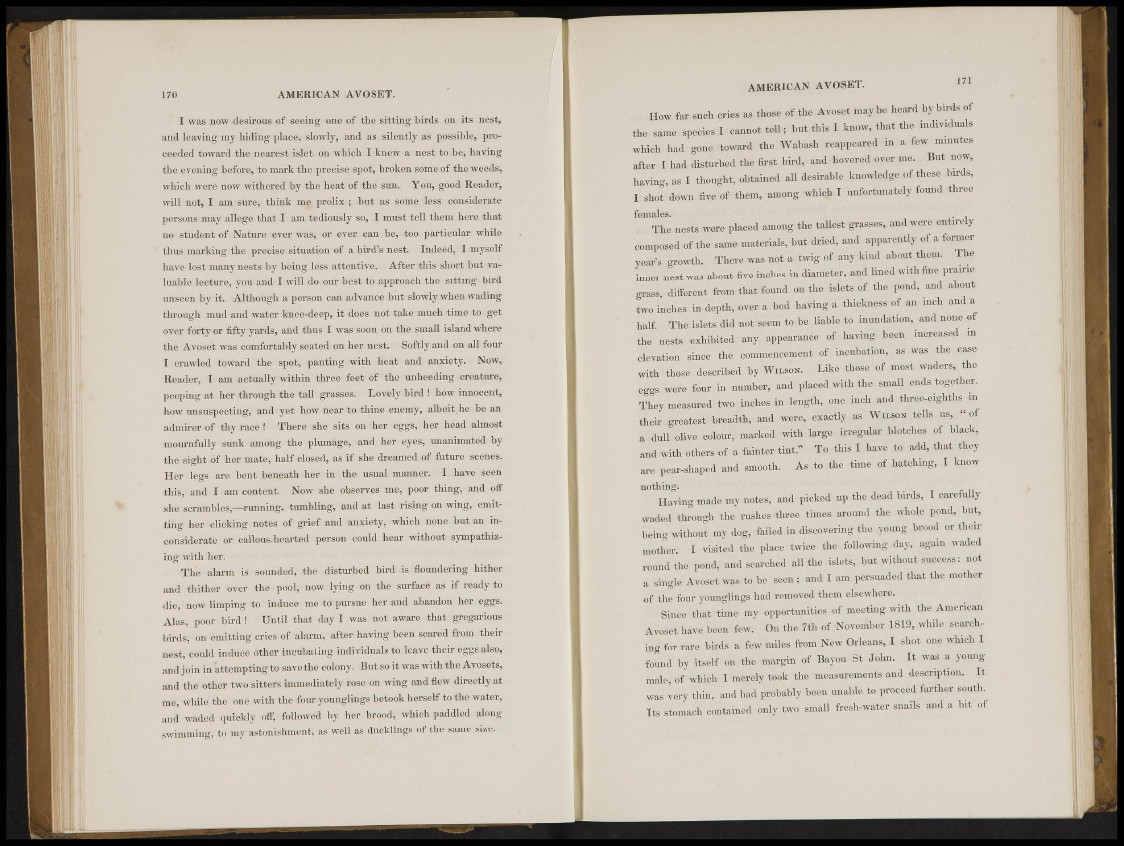
170 AMKRK'AN AVOSKT.
I was now desirous of seeing one of the; sitting birds oil its nest,
and leaving my hiding pkcej slowly and as: silently as possible, proceeded
toward the nearest islet on which I knew a nrst to be,«having
tin! evening before, to mark the precise-spot, broken, sumevol' tin: weeds,
which were now withered by the heat of the San. You, good Readier.,
will not, I am sure, think me prolix ; but as some -less considerate
persons may àllKjpî.tlmt. I :rai tediously so, I must.stell them here that
no student of Nature ever was, or ever ean be; too particular while
thus marking the presse situation of a bird's nest Indeed, I myself
have lost many nests by being less atrentke. After this short but vnluablglecture,
you and I will do our best to approach the- sitting bird
unseen by i t Although a person can advance buti-skiwly when wading
through mud and water knee-deep, it does not take much time to .get
over forty or fifty yards, and thus I wassoon on the small island whore
the Aveset was comfortably seated on her nest. .Softly and on- all four
I Crawled toward the spot, panting with heat and anxiety. Now,
Reader, I am actually within three feet èf the unheeding creature,
peeping at her through the tall grasses. -Lovely bird ! how innocent-,
how unsuspecting, and yet how near to thino enemy, albeit, he be an
admirer of thy «ace ! There she sits, on her eggs, her head .almost
•m'ournfullv sunk among the plumage, and lier «yes, unanimated by
the.sight of her mate, half closed,.-as if she dreamed of future scenes.
Her tegs are l ^ f e bsngaith her in the usiml manner. I have soon
this, and I am content. Now she observes .me, poor thing, and off
she scramble.-, running, tumbling, and at last rising on wing, emitting
lier clicking notes: of griot' and anxiety, which none tat an inconsiderate*
or callous-hearted person could hoar without .¡Sympathizing
with her.
The alarm is sounded, thé ¡disturbed bird is floundering hither
and thither over the pool, now lying on the surface as if ready to
die, now limping to induce me to pursue &v anil abandon her eggs,
Alas, poor bird ! l.'ntil that' day I was not aware that gregarious
birds, on emitting cries of alarm, after having been seared from their
nest, could induce, other incubating individuals to leave their eggs also,
and join in attempting to sm etbe colony. Butso it was with .theAyosets,
and the other two sitters immediately rtso on wing and flew directly at
me, while the one with the four younglings betook herself to the water,
and waded quickly rtf, followed bf; her brood, which paddled along
swimming, to my astonishment, as well a.s ducklings of the same size.
AMERICAN AVOSET. 171
, „ I I ow far such wies as those of t h e m a y . b e beard by birds of
M M B W I 'tot this D tarn that: the M M
which .had gone 'toward tbo Wabash, reappeared in a few minutes
after I had disturbed the fat .bird, and-hovered over me. But now,
having, as M M — I all desirable knowledge .of these birds,
I shot down five df them, among ,w£S#a unfortunately fiamd three
females. . .
: The nests were placed among the t a l l e s t gxasses, and were ent,r.dy
composed of the .same materials, but dried, and apparently of a former
year's 'growtlu There was not a twig of any kind about them. The
inner tnest was > about five indies in diameter, and linsd with fine prairie
different from that found ou tlie. islets of the pond, and .about
two inches in depth, .over-a ted having a thickness of .an inch and a
half The islets did notseem to be liable to inundation, » d mm g j
the nests -exhibited any appearance ^ having, bean increased m
— the commencement of incubatifl^jas wasi i » case
wiB. those detoibfed by WIESON. Like tho^ of most, waders, the
• W W four in number, and placed with the small ends together.
TheySneasured two ^tehes in length, one inqfc and three-eighths m
t h « neatest ibreadth, and.were, .exactly as Wiuos «I s us,,fflf
a dull olive colour, marked with large irregular blotches of black,
ami with others of a fainter tint." To this I have to add, that they
are pear-shaped and smooth. As to the tune of hatching, I know
nothing. • ' • 1 '' '•" ' ' ' , _ , ' „
Having made my t « l , and picked up the dead birds, I carefully
Waded through ifche rushes three times wound the «hole pond, but,
b e i n g without my dog, failed in discovering the .young brood or thew
mother. I visited the place twice the following day, again waded
round the pond, and searched all the islets, but wiihout success: not
« single Avosot ami I am persuaded that the mother
of tie four jwi g f e g s had removed the» elsewhere.
Since that time my opportunities of meeting with the American
M f c h s v e been few. On the 7th o t » v eAe r 1819, while searching
for rate1 ¡birds a few miles from New Orleans, I shot which X
fetid by ifetff on the margin of Bay« » John. It was a young
maie, of which I merely took the measurements and description. It
was very thin, and had probably ton unable to proceed farther south.
Its stomach contained only two small fresh-water snails and a bit of